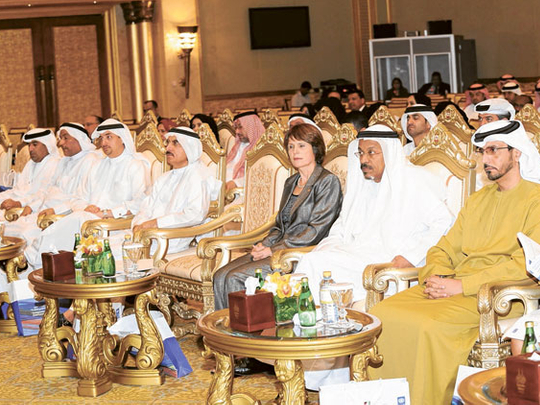
Abu Dhabi: The UAE has been ranked first on the human development index among Arab countries, according to a 2010 Human Development Report released by the United Nations Development Programme during a ceremony on Tuesday.
The country was also ranked 32nd out of 169 countries globally, according to the report.
Celebrating the 20th anniversary of the Human Development Report, UNDP presented for the first time its 2010 report after measuring human development in terms of the distribution of achievements and opportunities within societies.
An inequality-adjusted human development index (HDI) assessed relative progress among national groups on the criteria of health, education and income.
"Human development is considered a paramount goal, and the primary pillar of the UAE's strategy for comprehensive progress," Shaikha Lubna Bint Khalid Al Qasimi, UAE Minister of Foreign Trade, said.
"The UAE's attainment of this advanced position is embodied primarily in its highly developed economic, social, security and living conditions, which have in turn played an integral part in catalysing the inflow of most of the region's foreign investments directly into the UAE, which has become a global business and investment hub," she said.
Consistent gains
During a human development country profile, the UAE HDI value for 2010 was labelled by the UNDP as under the "very high human development category". The UAE's HDI value has increased by 30 per cent since 1980, based on consistent time series data and new component indicators which measured the country's life expectancy, expected years of schooling, gross national income (GNI) per capita (PPP US dollars) and HDI value.
Despite the UAE's GNI per capita falling from $108,211 (Dh397,459) in 1980 to $58,006 in 2010, the report shows that life expectancy at birth since 1980 has risen from 67.5 to 77.7 years in 2010. The number of years spent in school has risen 33.7 per cent since 1980.
Explaining the drop in the UAE's GNI per capita over the past 30 years, Francisco Rodriguez, senior policy adviser in the Human Development Report Office, said: "The price of oil in 1980 was around $30 a barrel, which back then was more money than the levels that the old prices have been recently adjusted to. There were higher levels of physical oil production, which means that between 1980 [and] 2010, the UAE has witnessed less econ-omic growth".
"Despite the decline in oil revenues, however, the UAE has shown improvement in health and education, which indicates that human development attributes to a country's overall HDI value."
A country's long-term progress can be assessed relative to its neighbours, in terms of geographical location and HDI value, added the report.
For instance in 1980, the UAE, Bahrain and Kuwait had close HDI values for countries in the Arab world. Since that time however, the three countries experienced different degrees of progress in increasing their HDI's.
Speaking about areas that need improvement in the UAE, Rodriguez explained that new indexes need to be introduced to measure the high living standards in comparison to certain income levels in the country. "The multi-dimensional poverty index for the UAE is as small as 0.6 per cent. We still have no data to back income inequality, but our speculation shows that it may be considerable," he said.
"Another challenge is that despite gender equality improving — with up to 77 per cent of adult women in the UAE attaining secondary or higher levels of education similar to men — gender equality is still at a lower level compared to other countries in the world. Lower female-labour participation drags down a country's HDI."












